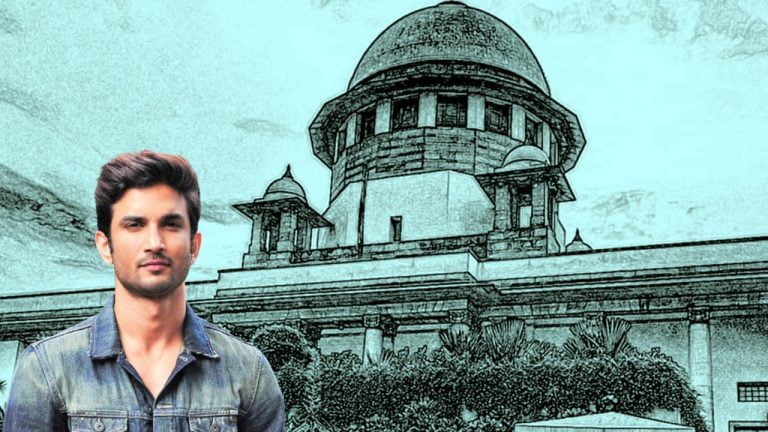

The judgment delivered by Supreme Court on 19th August 2020 in the case relating to sad cessation of Sushant Singh Rajput has stirred the applicable law having its origin in Code of Criminal Procedure {Chapter XII & XIII}. The judgment has its traces in T.P. (Crl) No. 225 of 2020 by Rhea Chakraborty for transfer of case/FIR registered in the State of Bihar in terms of section 154 Cr.P.C. at the instance of the father of the deceased to the State of Maharashtra u/s 406 of Cr.P.C.
The filing of the case under the provision (supra) itself is fallacious. The provision deals with the transfer of cases & appeals and not even remotely concerned with the transfer of investigation. Since the dispute qua the investigation was between the two States namely, State of Bihar & State of Maharashtra; it was appropriate for the petitioner to invoke the provision of Article 32 instead of section 406 Cr.P.C.
Prof. Glanville Williams while criticizing the decision of the House of Lords in the case of Anderson Vs. V.S. Ryan (1985) AC 560 said that
“The tale I have to tell is unflattering of the higher judiciary. It is an account of how the judges invented a rule-based upon conceptual misunderstanding; of their determination to use the English Language so strangely that they spoke what by normal criteria would be termed untruths; of their invincible ignorance of the mess they had made of the law; and of their immobility on the subject, carried to the extent of subverting an Act of Parliament designed to put them straight”.
The great constitution expert late H.M. Seervai in Fourth Edition of Constitutional Law of India while discussing the literary criticism (supra) said Unlike our Supreme Court, the House of Lords did not feel offended by the very strong language in which its judgment had been criticized by an acknowledged master of criminal law. The query, Quis Custodiet Ipsos Custodes? means “Who will watch the watchmen themselves”.
 For, where a final court goes wrong, gravely wrong, there is no way of setting it right except by criticism from recognized authorities on the subject, or from competent laypersons. Far from taking offence, Lord Bridge who delivered the leading judgment in R.V. Shvpuri overruling Anderson V. Ryan concluded his judgment thus:
For, where a final court goes wrong, gravely wrong, there is no way of setting it right except by criticism from recognized authorities on the subject, or from competent laypersons. Far from taking offence, Lord Bridge who delivered the leading judgment in R.V. Shvpuri overruling Anderson V. Ryan concluded his judgment thus:
“I cannot conclude this opinion without disclosing that I have had the advantage, since the conclusion of the arguments in this appeal, of reading an article by Prof. Glanville Williams entitled ‘The Lords and Impossible Attempts, or Quis Custodiet Ipsos Custodes? (1986) C.L.J. 33. The language in which he criticizes the decision in Anderson V. Ryan is not conspicuous by its moderation, but it would be foolish, on that account not to recognize the force of the criticism and churlish not to acknowledge the assistance I have derived from it.”
No doubt he said that the language of Prof. Glanville William’s article was not “conspicuous by its moderation” but rightly added that “it would be foolish, on that account, not to recognize the force of the criticism and churlish not to acknowledge the assistance I have derived from it.” It goes to show without the least doubt the receptive attitude of the House of Lords qua the criticism of their judgment.
Anyway when Supreme Court has taken up the matter and the parties were duly represented by the eminent lawyers’; it appears from the judgment that none of the lawyers has cited the legal mandate that the investigation by the Police shall not be questioned on the ground that the Officer holding the investigation is not empowered to hold an investigation, in view of section 156(2) Cr.P.C., the same reads thus:
“No proceeding of a police officer in any such case shall at any stage be called in question on the ground that the case was one which such officer was not empowered under this section to investigate.”
The settled law is that if the Investigating Officer holding the investigation concludes that the case lacks territorial jurisdiction; the investigation shall be transferred to the Police Station having the jurisdiction. This is supported by the leading precedents ‘Satvinder Kaur VS. State (Govt. of NCT Delhi)’ 1998(8) SCC 728.
Albeit the judgment of Satvinder Kaur was referred but the proposition relating to the questionability of the power of the Investigating Officer was not discussed. The judgment (supra) was referred only for jurisdiction for the registration of the FIR. Section 156(2) of Cr.P.C. was left to glow in seclusion. This glaring defect led the Supreme Court to exercise the powers under Article 142 of the Constitution of India. Despite having the clear legal provision namely, 156(2) Cr.P.C.
The complete reading of judgment reveals in no uncertain terms that the State of Maharashtra has not been blemished for any kind of botched-up investigation. Despite the unstoppable cries, shouts and commotions raised by the media.
The question germane to the controversy is that if the father of the deceased was not convinced with the line of investigation adopted by the Mumbai Police; the remedy was to furnish information of cognizable offence to the concerned Police station at Mumbai. Even, thereafter, if the FIR was not registered, then to furnish the information to D.C.P. u/s 154(3) Cr.P.C. Despite this, if the FIR is not registered, the complaint u/s 2(d) of Cr.P.C. was to be filed before Jurisdictional Magistrate at Mumbai, either for the order u/s 156(3) to register the FIR or to hold an inquiry in terms of section 200 to 204 Cr.P.C.
The observation of the Supreme Court in the judgment under the caption ‘Options before Mumbai Police‘.
“However, the incidents referred to in the complaint do indicate that the Mumbai Police also possess the jurisdiction to undertake investigation on those circumstances. Therefore, in the event of a case being registered also at Mumbai, the consent for the investigation by the CBI u/s 6 of the DSPE Act can be competently given by Maharashtra Government.” is contrary to the ratio laid down in T. T. Anthony’s case.
T.T. Anthony, (2001) 6 SCC 181, the same reads thus:-
“All other information’s made orally or in writing after the commencement of the investigation into the cognizable offence disclosed from the facts mentioned in the first information report and entered in the station house diary by the Police Officer or such other cognizable offences as may come to his notice during the investigation, will be statements falling under section 162 Cr.P.C. No such information/statement can properly be treated as an FIR and entered in the station house diary again, as it would in effect be a second FIR and the same cannot be in conformity with the scheme of Cr.P.C.”, no second FIR would be subjected to an independent investigation. Rather the subsequent FIR(s), if lodged, would be clubbed with the first FIR.
The most pivotal fact of the matter is that the power of Article 142 of the Constitution of India has been exercised by the learned Single Judge of Supreme Court while directing the CBI to hold the investigation. Therefore, it has become inalienably essential in the holy trinity of law, justice and fair-play that the Intra Court appeal has to be provided.
The leading legal luminary Mr. Kapil Sibal in his article dated 9th Oct,2017 under the caption “In the corridors of justice, writes Kapil Sibal” said:
“use of Article 142 of the Constitution has even more serious consequences. Such power, according to the Court, can only be exercised in the absence of remedies available in law. Yet, the Court has often deviated from this salutary principle and used Article 142 to do what it thinks best. The hierarchy of Courts allows errors to be corrected when the this moves up the hierarchy, ending in the Supreme Court. But if the Court of last resort, either through PILs or in the exercise of power under Article 142 acts as the Court of first instance, litigants are left remediless. Individuals and entities have suffered unjustifiably at the hands of the Court.”
Therefore, the Supreme Court is required to amend its rules accordingly lest the justice becomes the travesty.
————–


Disclaimer : PunjabTodayTV.com and other platforms of the Punjab Today group strive to include views and opinions from across the entire spectrum, but by no means do we agree with everything we publish. Our efforts and editorial choices consistently underscore our authors’ right to the freedom of speech. However, it should be clear to all readers that individual authors are responsible for the information, ideas or opinions in their articles, and very often, these do not reflect the views of PunjabTodayTV.com or other platforms of the group. Punjab Today does not assume any responsibility or liability for the views of authors whose work appears here.
Punjab Today believes in serious, engaging, narrative journalism at a time when mainstream media houses seem to have given up on long-form writing and news television has blurred or altogether erased the lines between news and slapstick entertainment. We at Punjab Today believe that readers such as yourself appreciate cerebral journalism, and would like you to hold us against the best international industry standards. Brickbats are welcome even more than bouquets, though an occasional pat on the back is always encouraging. Good journalism can be a lifeline in these uncertain times worldwide. You can support us in myriad ways. To begin with, by spreading word about us and forwarding this reportage. Stay engaged.
— Team PT


Copyright © Punjab Today TV : All right Reserve 2016 - 2024 |